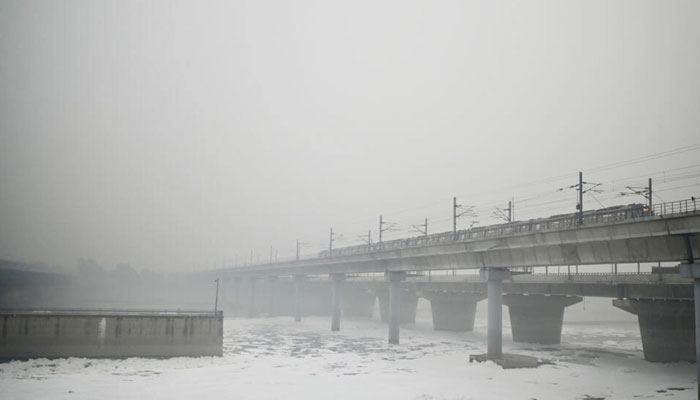SL cancel practice in toxic Delhi smog
NEW DELHI: Sri Lanka cancelled Saturday´s training session in India´s capital with a pall of toxic smog engulfing the megacity just days before it hosts their World Cup clash against Bangladesh.
New Delhi is regularly ranked as one of the most polluted cities on the planet, with its annual smog problem blamed for hundreds of thousands of premature deaths each year.
On Saturday it again ranked the city with the most noxious air on the planet, according to monitoring firm IQAir.
An official at the local cricket association in Delhi confirmed to AFP that Sri Lanka had not staged their scheduled practice session.
“They haven´t shared any reason for cancelling their training,” the official told AFP.
But the cancellation comes a day after Bangladesh also called off their own training in Delhi, citing health risks from the smog. “Some of us developed coughing, so there´s a risk factor,” Bangladesh team director Khaled Mahmud said Friday.
“We don´t want to get sick. We don´t know if things will improve,” he added.
The International Cricket Council (ICC) said it was monitoring Delhi´s air quality and took seriously “the wellbeing of all participants” ahead of Monday´s match.
“We are taking expert advice to assess the situation,” their statement said.
World Cup organisers this week banned fireworks at matches in Mumbai and Delhi to avoid worsening air pollution levels in both cities.
Levels of the most dangerous airborne PM2.5 particles -- so tiny they can enter the bloodstream -- were on Saturday evening more than 20 times the daily maximum recommended by the World Health Organization, according to IQAir.
Severe smog levels are expected to persist beyond Monday´s match for several more weeks, with authorities ordering school closures on Friday. Smoke from farmers burning crop stubble, vehicle exhaust and factory emissions combine every winter to blanket Delhi in a choking haze, a public health crisis that has persisted for decades.
-
 Prince Harry Reacts As Beatrice, Eugenie's Names Surface In Epstein Emails
Prince Harry Reacts As Beatrice, Eugenie's Names Surface In Epstein Emails -
 Cyprus Joins European AI Race: What It Means For Greek LLMs And Regional Innovation
Cyprus Joins European AI Race: What It Means For Greek LLMs And Regional Innovation -
 Amazon Soon To Launch 'AI Content' Marketplace, Says Report
Amazon Soon To Launch 'AI Content' Marketplace, Says Report -
 Is AI Reliable For Health Advice? New Study Raises Red Flags
Is AI Reliable For Health Advice? New Study Raises Red Flags -
 WhatsApp Web Starts Rolling Out Voice And Video Calling For Beta Users
WhatsApp Web Starts Rolling Out Voice And Video Calling For Beta Users -
 Catherine O’Hara’s Cause Of Death Finally Revealed
Catherine O’Hara’s Cause Of Death Finally Revealed -
 Swimmers Gather At Argentina’s Mar Chiquita For World Record Attempt
Swimmers Gather At Argentina’s Mar Chiquita For World Record Attempt -
 Brooklyn Beckham, Nicola New Move Could Leave David, Victoria Reeling
Brooklyn Beckham, Nicola New Move Could Leave David, Victoria Reeling -
 Anthropic Criticises ChatGPT Ads As OpenAI Begins Testing Advertising In AI Chats
Anthropic Criticises ChatGPT Ads As OpenAI Begins Testing Advertising In AI Chats -
 YouTube Star MrBeast Acquires Step: Redefining Finance For Gen Zs
YouTube Star MrBeast Acquires Step: Redefining Finance For Gen Zs -
 Sarah Ferguson Plans Big Move To Cause ‘serious Damage’ To Andrew
Sarah Ferguson Plans Big Move To Cause ‘serious Damage’ To Andrew -
 Trump Nears 500 Press Interactions In His Second Term, Surpassing Former President Biden
Trump Nears 500 Press Interactions In His Second Term, Surpassing Former President Biden -
 Hailee Steinfeld Reveals Her Plans To Return To Music
Hailee Steinfeld Reveals Her Plans To Return To Music -
 Elon Musk Unveils SpaceX Plan For Civilian Moon, Mars Trips
Elon Musk Unveils SpaceX Plan For Civilian Moon, Mars Trips -
 MTG Commander Banned Update: Wizards Frees Infamous Instant-win Card
MTG Commander Banned Update: Wizards Frees Infamous Instant-win Card -
 Royal Family Braces For ‘final Blow’ As Andrew Scandal Deepens
Royal Family Braces For ‘final Blow’ As Andrew Scandal Deepens




